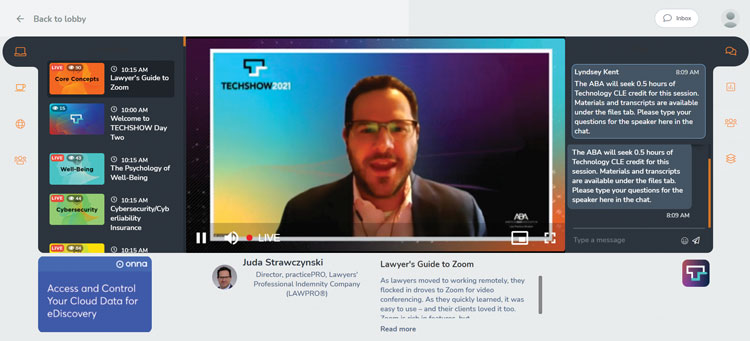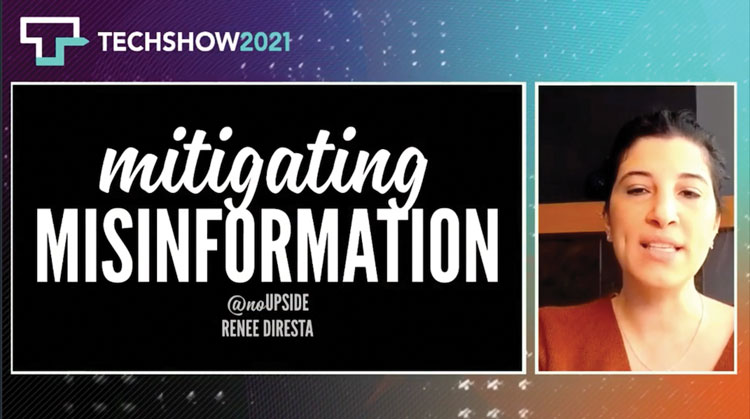First all-virtual ABA Techshow emphasized that web conferencing tools are here to stay

Shutterstock
Thanks to the ongoing coronavirus pandemic, the first-ever all-virtual ABA Techshow was held in March. Instead of crowded expo halls, packed conference rooms and in-person networking events, conferencegoers logged on to the Techshow virtual platform and watched live remote talks and panel discussions addressing various issues relating to law and technology. In addition to sessions about cybersecurity, artificial intelligence, analytics and ethics, there were the usual introductory tracks showing attendees the basics of Adobe Acrobat, practice management software, Microsoft 365 and marketing. Some more forward-looking sessions examined topics such as how updating technology can allow lawyers to comply with ethical obligations, the continued growth of legal incubator programs and how automated legal reasoning could change the way laws are written.
But the proliferation of remote conferencing tools was at the forefront of Techshow, and many sessions dealt with the new reality for lawyers—one in which tools like Zoom, Microsoft Teams, Skype and others are integral, even vital parts of their practice.
In one of several sessions relating to remote practice, Pennsylvania lawyer Daniel J. Siegel cautioned lawyers working from home that family members as well as virtual assistants such as Amazon Alexa might hear confidential client conversations they shouldn’t. “Working remotely, there’s the potential for eavesdropping from nosy family members,” he said.
Siegel, a small-firm attorney who handles workers’ compensation, personal injury and Social Security disability claims, lives with his son, who spent most of the pandemic working from home, and his wife, who would go to an upstairs room during his client calls.
“She couldn’t hear me, so that was fine,” said Siegel, who serves on the council of the ABA Law Practice Division and chairs the Pennsylvania Bar Association’s committee on legal ethics and professional responsibility.
In addition to avoiding client conversations in home spaces where family members can hear them and limiting or prohibiting the use of virtual assistants, Siegel suggested lawyers working remotely encrypt information sent by email; keep computer operating systems updated to avoid cyberattacks; and do their work on a virtual private network with two-factor authentication. He also recommended having a firmwide policy on what is required for working from home and making sure all employees understand it.
Another session dealt with “Zoom etiquette” and how to or how not to behave while using the popular videoconferencing tool. For instance, even if you are on mute, talking during a Zoom meeting is rude because it shows you are not listening. It’s also a bad idea to drive your car while using the platform. And if everyone else has his or her camera turned on during a Zoom meeting, you should too, so work flow is not interrupted.
Juda Strawczynski, a director for the Lawyers’ Professional Indemnity Company in Canada, shared these tips, which he described as “netiquette,” at an event titled “Lawyer’s Guide to Zoom.”

Juda Strawczynski: “We will be using these sorts of technology well into the future because clients want it—it’s cost-effective.” Photo by Lyle Moran and Stephanie Francis Ward
“We will be using these sorts of technology well into the future because clients want it—it’s cost-effective. It won’t replace every face-to-face meeting, but we will use this technology going forward,” said Strawczynski, who manages a claims and risk initiative for LAWPRO.
Lawyers were also encouraged to embrace and further develop the technological and business innovations they have adopted in recent months even after the COVID-19 pandemic subsides. “We have the opportunity today to build towards that third horizon or slouch back towards that first horizon,” said Ed Walters, CEO and co-founder of legal research company Fastcase. He urged attendees to “build the legal services and law firms of 2022, not rebuild what was broken in 2019.”
For example, Clio CEO Jack Newton pointed out that 69% of consumers prefer working with a lawyer who can share documents electronically, and more than 50% of consumers believe most legal matters can be dealt with remotely. Newton said law firms and lawyers have to a much greater degree adopted such tools during the pandemic, and those who have not would be wise to do so. “This is how you will thrive in this new environment,” said Newton, author of The Client-Centered Law Firm: How to Succeed in an Experience-Driven World.

Keynote speaker Renée DiResta encouraged attendees to think in advance about how new technologies could be used for nefarious purposes once they become publicly available. Photo by Lyle Moran and Stephanie Francis Ward
As technology becomes more prevalent, lawyers could play an important role in helping policymakers and industry leaders think through the various trade-offs of strictly regulating innovative technologies. Keynote speaker Renée DiResta, technical research manager at Stanford Internet Observatory, who investigates the spread of malign narratives across social networks, urged lawyers and policymakers to help counteract that problem by thinking in advance about how new technologies could be misused once they enter the marketplace.
She said this approach would help ensure “that rather than reacting, there is some thoughtful policy creation, and we are a little bit ahead of the game.”
This story was originally published in the June/July 2021 issue of the ABA Journal under the headline: “Remote Learning: The first all-virtual ABA Techshow emphasized that web conferencing tools are here to stay.”



